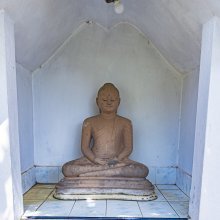Ranga, Raṅga, Ramga: 32 definitions
Introduction:
Ranga means something in Buddhism, Pali, Hinduism, Sanskrit, Jainism, Prakrit, the history of ancient India, Marathi, biology. If you want to know the exact meaning, history, etymology or English translation of this term then check out the descriptions on this page. Add your comment or reference to a book if you want to contribute to this summary article.
Ranga has 31 English definitions available.
Images (photo gallery)
Languages of India and abroad
Sanskrit dictionary
[Deutsch Wörterbuch]
Source: Cologne Digital Sanskrit Dictionaries: Böhtlingk and Roth Grosses Petersburger WörterbuchRaṅga (रङ्ग):—(von rañj)
1) m. a) Farbe [Trikāṇḍaśeṣa 3, 3, 67.] [Hemacandra’s Anekārthasaṃgraha 2, 45. fg.] [Medinīkoṣa g. 19.] na bhāti vāsasi kliṣṭe raṅgayoga ivāhitaḥ [Suśruta 2, 157, 8.] vāso yathā raṅgavaśaṃ prayāti [Mahābhārata 5, 1269.] — b) nasale Färbung eines Vocals [ŚIKṢĀ 26. 30]; vgl. [Weber’s Indische Studien 4, 269. 362] und rakta . — c) Theater, Schaubühne, Schauplatz, Arena [Pāṇini’s acht Bücher 6, 4, 27,] [Scholiast] [Hemacandra’s Abhidhānacintāmaṇi 282.] [Halāyudha 1, 97.] = nṛtyayudbhuvoḥ (ist wohl nṛtyabhū und yudbhū) [Hemacandra’s Anekārthasaṃgraha] = nṛtye raṇakṣitau [Medinīkoṣa] = nṛtya, raṇa, khala [Trikāṇḍaśeṣa -] [Mahābhārata 1, 152. 4415. 4417. 5347. 3, 2193. 2198. 4, 341. 345. 6, 3528. 7, 3932.] [Harivaṃśa 4211. 4532.] yathācāryopadeśena raṅgaśobhī bhavennaṭaḥ [Bharata] [NĀṬYAŚ. 34, 82.] raṅgādbahistu nepathyam [Bharata] beim Schol. zu [Śākuntala 3, 6.] praveśa [Mṛcchakaṭikā 17, 11. 82, 23.] [Kathāsaritsāgara 49, 14.] [Rājataraṅgiṇī 1, 223.] raṅgavighnopaśānti [Sāhityadarpana 281.] [Oxforder Handschriften 141,b,22. 41.] malla [Bhāgavatapurāṇa 10, 36, 24. 42, 33.] pīṭha [Daśakumāracarita 77, 11.] śailūṣasyeva me rājyaraṅge sminvalgataściram [Rājataraṅgiṇī 2, 156.] tāruṇyahelārati [Śrutabodha 34.] Theater so v. a. die Zuschauer [SĀṂKHYAK. 59.] aho rāgabaddhacittavṛttirālikhita iva sarvato raṅgaḥ [Śākuntala 4, 12. fg.] raṅgaṃ prasādya madhuraiḥ ślokaiḥ [DAŚAR. 3, 4] [?= Sāhityadarpana 284.] prasādana (prasādhana gedr.) [PRATĀPAR. 25,a,9.] — d) Borax. — e) der aus der Acacia Catechu gewonnene Catechu-Extract [Rājanirghaṇṭa im Śabdakalpadruma] — f) Nomen proprium eines Mannes [Rājataraṅgiṇī 5, 353. 396. fgg.] —
2) n. (m. n. [Medinīkoṣa]) = vaṅga Zinn [Amarakoṣa 2, 9, 106.] [Trikāṇḍaśeṣa 2, 9, 34. 3, 3, 61. 67.] [Hemacandra’s Abhidhānacintāmaṇi 1042.] [Hemacandra’s Anekārthasaṃgraha] [Medinīkoṣa] — Vgl. anaṅga, keli, dīrgharaṅgā, dṛḍharaṅgā, naṭaraṅga, nī, paṭṭa, patta, pūrva, matsya (unter raṅka), yuddha, raṇa, rāja, śrī, sa, su .
--- OR ---
Rāṅga (राङ्ग):—[Dhūrtasamāgama] in [Lassen’s Anthologie 67, 2] vielleicht fehlerhaft für vāṅga .
Source: Cologne Digital Sanskrit Dictionaries: Sanskrit-Wörterbuch in kürzerer FassungRaṅga (रङ्ग):——
1) m. — a) Farbe [Carakasaṃhitā 6,18.] [Lalitavistarapurāṇa 334,4.] — b) nasale Färbung eines Vocals. — c) Theater , Schaubühne , Schauplatz , Arena. — d) Theater , so v.a. die Zuschauer. — e) ein best. Tact. [Saṃgitasārasaṃgraha 207.] — f) Borax. — g) Catechu-Extract [Rājan 8,31.] — h) Nomen proprium eines Mannes. —
2) m. n. (dieses besser beglaubigt Zinn [Rājan 13,21.])
--- OR ---
Rāṅga (राङ्ग):—m. etwa Schauspieler.
Sanskrit, also spelled संस्कृतम् (saṃskṛtam), is an ancient language of India commonly seen as the grandmother of the Indo-European language family (even English!). Closely allied with Prakrit and Pali, Sanskrit is more exhaustive in both grammar and terms and has the most extensive collection of literature in the world, greatly surpassing its sister-languages Greek and Latin.
See also (Relevant definitions)
Starts with (+215): Ramgabhumike, Ramgagara, Ramgagite, Ramgakusala, Ramgalisu, Ramgamahalu, Ramgamalar, Ramgamamtapa, Ramgambogu, Ramgaparikara, Ramgapuje, Ramgare, Ramgasajjike, Ramgasamagri, Ramgashale, Ramgashilpi, Ramgasiddhate, Ramgatalimu, Ramgatamtra, Ramgavale.
Ends with (+283): Abashairanga, Abbashai-ranga, Abhiranga, Abhramga, Acaranga, Acchanikuranga, Acchaniuramga, Acharanga, Adbhutaranga, Adharanga, Adhvaraturamga, Adiranga, Ahavaramga, Ajiramga, Akashataramga, Aksharanga, Ambavaranga, Amburanga, Amdajaturamga, Amkuramga.
Full-text (+378): Rangajiva, Rangaja, Purvaranga, Nagaranga, Yuddharanga, Dirgharanga, Sthiraranga, Rangavatarana, Rangavataraka, Rangapitha, Rangashala, Rangabhuti, Rangamandapa, Ranganatha, Rangakara, Rangakshara, Rangadridha, Rangapradipaka, Rangalasini, Rangada.
Relevant text
Search found 45 books and stories containing Ranga, Raṅga, Ramga, Rāṅga, Rāṅgā, Raṅgā, Raṃga; (plurals include: Rangas, Raṅgas, Ramgas, Rāṅgas, Rāṅgās, Raṅgās, Raṃgas). You can also click to the full overview containing English textual excerpts. Below are direct links for the most relevant articles:
Garga Samhita (English) (by Danavir Goswami)
Verses 5.7.34-35 < [Chapter 7 - The Killing of Kuvalayāpīḍa]
Verse 5.11.14 < [Chapter 11 - The Stories of Kubjā and Kuvalayāpīḍa]
Verse 4.14.2 < [Chapter 14 - The Story of the Jālandharīs]
Sahitya-kaumudi by Baladeva Vidyabhushana (by Gaurapada Dāsa)
Text 9.41 [snake diagram] < [Chapter 9 - Ornaments of Sound]
Text 4.3 < [Chapter 4 - First-rate Poetry]
Text 7.155 < [Chapter 7 - Literary Faults]
The Matsya Purana (critical study) (by Kushal Kalita)
Part 1a - Note on Architecture (vāstu) < [Chapter 7 - Art and Architecture in the Matsyapurāṇa]
Preceptors of Advaita (by T. M. P. Mahadevan)
Bhakti-rasamrta-sindhu (by Śrīla Rūpa Gosvāmī)
Verse 4.9.20 < [Part 9 - Incomplete Expression of Mellows (rasābhāsa)]
Verse 1.2.239 < [Part 2 - Devotional Service in Practice (sādhana-bhakti)]
Verse 2.1.264 < [Part 1 - Ecstatic Excitants (vibhāva)]
Tattvartha Sutra (with commentary) (by Vijay K. Jain)
Verse 3.12 - The colours of the mountain chains < [Chapter 3 - The Lower World and the Middle World]
Verse 2.20 - The objects of the five senses (indriya) < [Chapter 2 - Category of the Living]
